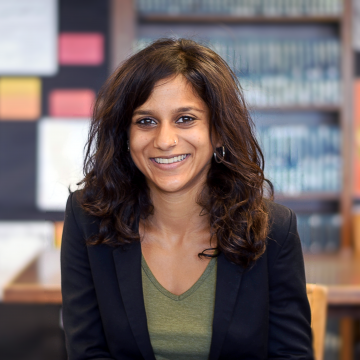Student Spotlight: Aditi Sahasrabuddhe
Cooperation in Financial Crises
 Aditi Sahasrabuddhe is a doctoral student in government with a focus on international relations from Goa, India. After earning her bachelor’s degree at Edinburgh University and master’s degree at the London School of Economics and Political Science, she chose to attend Cornell due to the ability to work with faculty across fields, friendliness of those in the field of government, and available resources.
Aditi Sahasrabuddhe is a doctoral student in government with a focus on international relations from Goa, India. After earning her bachelor’s degree at Edinburgh University and master’s degree at the London School of Economics and Political Science, she chose to attend Cornell due to the ability to work with faculty across fields, friendliness of those in the field of government, and available resources.
What is your area of research and why is it important?
I study the politics of international finance. I am looking into the dynamics that shape international central bank cooperation for financial crisis management. I focus on the use of specific policy instruments known as central bank currency swaps that are used to alleviate funding pressures through an exchange (or swap) of currencies between two central banks. I identify the conditions under which central banks are most likely to cooperatively manage financial crises with these tools. From a comparative historical perspective, I show that central bankers’ personal relationships with their foreign counterparts influence international cooperation to address global financial crises.
What are the larger implications of this research?
Central bank swaps proved crucial to managing the 2008 financial crisis. Most recently, the use of swaps was enhanced in one of several measures* taken by the Federal Reserve to manage the financial fallout of the COVID-19 pandemic. But such tools are seldom used, save for extraordinary circumstances. The absence of international cooperation using such instruments has led to dire outcomes in the past, such as the 1930s Great Depression. Given these potential implications of the absence of central bank cooperation, my research helps us better understand theoretical and practical possibilities for cooperative policymaking in times of global financial stress.
[*I co-wrote a piece for the Washington Post on these policies last month, which explains these tools a bit more as well as what mine and my co-authors’ research tells us about what’s going on—The Fed’s using all its emergency tools to prevent economic disaster. Here are 4 things to know.]
What inspired you to choose this field of study?
International finance and banking have been a large part of my life. Having grown up around conversations on these matters, I’ve always been inclined towards them. I started college in the early years of the global financial crisis and wanted to have a better grasp on what was going on, so I chose to study economics. As I learnt that money is as political as it is economic, I double majored to study economics and politics. I took to studying international political economy towards the end of college and pursued a master’s degree in the subject. Now I’m here.
Where did you study with your Graduate School Research Travel Grant?
With the Graduate School Research Travel Grant, I travelled to Basel, Switzerland where I spent a few weeks at the archives of the Bank for International Settlements in the fall of 2019. The Bank is essentially a central bank for central banks, which holds most of the records, documents, and data that I use in my project.
How important was obtaining a Research Travel Grant for your research?
Obtaining a research travel grant was essential for my dissertation research. The materials that I accessed provide the bulk of the evidence I use to support my arguments. These documents and files can only be accessed on the Bank premises, so it was essential to be able to travel and spend a few weeks doing my fieldwork there in order to advance my project. While in Basel, I also had the chance to meet with experts in my field who work in the Bank’s Research and Banking departments, which was also a really valuable intellectual and professional opportunity.
What did this grant allow you to do that you might not have otherwise been able to?
This grant was essential to supporting my fieldwork in Basel, Switzerland. The funding covered a bulk of the cost of my flights and accommodation for multiple weeks in Basel. These data and other materials that I collected from the archive of the Bank for International Settlements are central to my dissertation, which I could not have done without the assistance of the Research Travel Grant.
What are your hobbies or interests outside of your research or scholarship?
Outside of my research, I like to spend my time outdoors. I run a lot, and really enjoy the trails near the Cornell campus and around town. I practice yoga quite regularly and also play the flute. In the summers, I spend most of my free time sailing or windsurfing on Cayuga lake. I like to travel whenever I get the chance.
Why did you choose Cornell to pursue your degree?
I chose to pursue my degree at Cornell because the of the excellent faculty in the field of government. I’ve been lucky to have extremely supportive advisors, whose research I’d been engaging with long before I started graduate school. I was also drawn to Cornell because I would have the chance to work with faculty across disciplines (specifically in applied economics) which has been a great opportunity. The government field is extremely collegial, with a very engaged and friendly grad student body. The wealth of resources and opportunities available through the university and the government field were an added plus.
